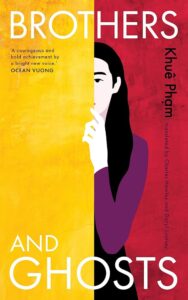Book Title: Brothers and Ghosts
Author: Khuê Phạm
Translated By: Charles Hawley & Daryl Lindsey
When I first picked up “Brothers and Ghosts” by Khuê Phạm, I was immediately intrigued by its unique place in contemporary German literature. Published in 2021, it is often hailed as the first novel about the Vietnamese diaspora in Germany. It belongs to a growing body of work that highlights the cultural diversity within the country, especially since the late 1960s. What struck me most was how Phạm, with her journalistic background, weaves together personal and historical narratives in a way that feels both intimate and detached at the same time. The clear, almost dispassionate prose masks the deeply complex themes of identity, history, and displacement that ripple throughout the story.
Phạm’s choice to write with a narrative distance adds another layer to this already intricate story. The English translation of “Brothers and Ghosts” by Charles Hawley and Daryl Lindsey retains this sense of mediation, much like the novel itself, which explores the far-reaching effects of the Vietnam War. The original German title, “Wo Auch Immer Ihr Seid”(“Wherever You May Be”), hints at the novel’s thematic focus on open-ended exploration—both geographical and emotional. Phạm blends her family’s history, academic research, and eyewitness accounts, creating a textured portrayal of how identity, nationhood, and even gender evolve across generations.
The story’s central character, Kiều, serves as the lens through which we view this multifaceted world. A second-generation Vietnamese-German journalist, Kiều’s journey feels both relatable and distant. She comes from a relatively privileged background; her parents having successfully assimilated into German society after arriving as students from South Vietnam in 1968. Yet Kiều, despite her upbringing, grapples with her own identity. The symbolism behind her name is profound—Kiều, linked to a 19th-century Vietnamese poem, represents someone “other,” an immigrant. In contrast, she prefers to be called Kim, a name suggesting modernity and success, unburdened by a complex past.
One of the most poignant themes in “Brothers and Ghosts” is Kiều’s desire to be accepted as fully German. Although she was born and raised in Berlin, her identity is often questioned by those around her. The constant refrain of ‘Where are you from?’ feels like an echo of a broader societal reluctance to fully accept her as a native. Kiều’s constructed identity is continually challenged, not only by the society in which she lives but by her own family’s history, which she cannot easily escape. This struggle between wanting to belong and being seen as the “other” is something I found deeply resonant and thoughtfully portrayed.
As Kiều reflects on her parents’ experiences, “Brothers and Ghosts” delves into the burden of expectations carried by the older generation. Minh and Hoa, her parents, came to Germany with the hope of returning to South Vietnam to help their families and contribute to the nation’s development. However, disillusioned by the war, they became anti-war activists, a decision that strained their ties with both their homeland and their families. Their story reminded me of how personal convictions often clash with familial and national expectations, a theme that Phạm handles with great sensitivity.
One of the novel’s most compelling questions is how different generations interpret the Vietnam War and its aftermath. Should Kiều side with her parents, who opposed the war from the safety of Germany, or with her Southern Vietnamese relatives who suffered under the Communist regime? The novel doesn’t offer easy answers but instead allows space for reflection on how distance—both geographical and temporal—shapes our understanding of history. Kiều’s father’s belief that he can only truly understand the past from afar contrasts with the immediate pain and loss felt by those who remained in Vietnam.
Ultimately, “Brothers and Ghosts” is a story about distance—between generations, between cultures, and between the past and present. The narrative structure, with its use of letters, diaries, and oral accounts, mirrors the fragmented nature of memory itself. Kiều’s reflections on her family’s history and her place within it underscore the novel’s central tension: how do we reconcile our personal history with the larger forces that shape our world? In the end, I found Phạm’s novel to be a poignant exploration of identity and loss, a reminder that while we may bridge the gaps between past and present, some ghosts are impossible to leave behind.
*









Add comment